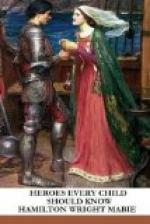I hope you have not forgotten, my dear child, that all the cruel wars of Scotland arose out of the debate between the great lords who claimed the throne after King Alexander the Third’s death. The Scottish nobility rashly submitted the decision of that matter to King Edward I of England, and thus opened the way to his endeavouring to seize the kingdom of Scotland to himself. It was natural that such of the people as were still determined to fight for the deliverance of their country from the English, should look round for some other King, under whom they might unite themselves, to combat the power of England.
Amongst these, the principal candidates, were two powerful noblemen. The first was Robert Bruce, Earl of Carrick; the other was John Comyn, or Cuming, of Badenoch, usually called the Red Comyn, to distinguish him from his kinsman, the Black Comyn, so named from his swarthy complexion. These two great and powerful barons had taken part with Sir William Wallace in the wars against England; but, after his defeat, being careful of losing their great estates, and considering the freedom of Scotland as beyond the possibility of being recovered, both Bruce and Comyn had not only submitted themselves to Edward, and acknowledged his title as King of Scotland, but even borne arms, along with the English, against such of their countrymen as still continued to resist the usurper. But the feelings of Bruce concerning the baseness of this conduct, are said, by the old tradition of Scotland, to have been awakened by the following incident. In one of the numerous battles, or skirmishes, which took place at the time between the English and their adherents on the one side, and the insurgent or patriotic Scots upon the other, Robert the Bruce was present, and assisted the English to gain the victory. After the battle was over, he sat down to dinner among his southern friends and allies, without washing his hands, on which there still remained spots of the blood which he had shed during the action. The English lords, observing this whispered to each other in mockery, “Look at that Scotsman, who is eating his own blood!” Bruce heard what they said, and began to reflect that the blood upon his hands might be indeed called his own, since it was that of his brave countrymen who were fighting for the independence of Scotland, whilst he was assisting its oppressors, who only laughed at and mocked him for his unnatural conduct. He was so much shocked and disgusted that he arose from table, and, going into a neighbouring chapel, shed many tears, and, asking pardon of God for the great crime he had been guilty of, made a solemn vow that he would atone for it by doing all in his power to deliver Scotland from the foreign yoke. Accordingly, he left, it is said, the English army, and never joined it again, but remained watching an opportunity for restoring the freedom of his country.




